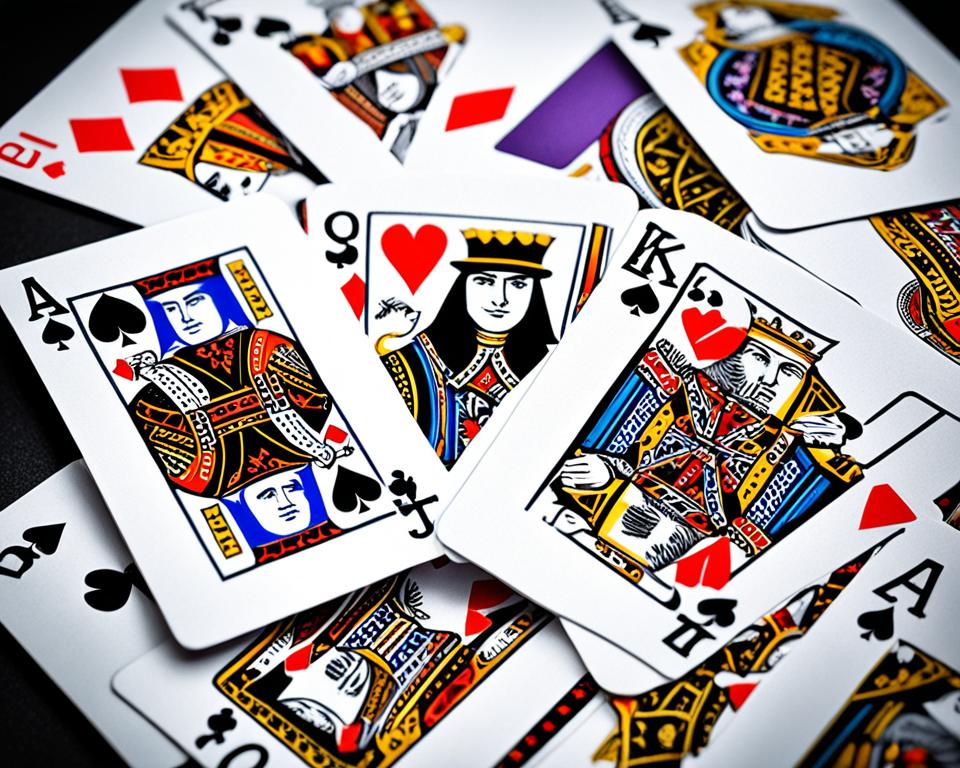Get ready to dive into the exciting world of poker. Here, the fun of the game meets smart strategies. This guide has everything you need – rules, tactics, and skills. It’s for anyone, from brand new players to those who love the game.
This article will teach you about hand rankings and how to read your opponents. It talks about poker rules, poker strategies, poker hands, poker tournaments, poker chips, poker psychology, poker odds, poker bluffing, and poker etiquette.
If you’re starting or want to get better, this guide is for you. It contains everything you need to learn to play poker like a pro. Get ready to impress everyone with your poker skills.
Introduction to the Exciting World of Poker
Poker is more than a game; it’s a tradition loved by many. It has grown over the years into a strategic and engaging pastime. Today, it attracts millions worldwide. Let’s dig into why poker is so alluring and why you might enjoy it too.
Poker: A Game of Skill and Strategy
At heart, poker is a mix of luck, skill, and strategy. Players must think through their hands carefully and consider their odds. The blend of chance with skillful choices is what sets poker apart. It makes every game exciting and challenging.
Why You Should Learn to Play Poker
Picking up poker comes with plenty of perks. It’s not just about winning hands; here’s how it can benefit you:
- Cognitive Development: It sharpens your thinking and problem-solving skills as you master its strategies.
- Social Engagement: Poker is often played with others, offering a chance to meet new people and learn from them.
- Financial Potential: With time, you might find opportunities to earn money from your skills or even make it a career.
- Excitement and Adrenaline: There’s nothing quite like the rush of a well-played hand or a big win in poker.
Want a mental workout or a new social outlet? Poker could be your answer. It offers adventure and skill-building, plus the chance for personal improvement. Dive in, and you’ll discover the world of poker is vast, with much to learn and enjoy.

“Poker is not about the cards you’re dealt, but about the decisions you make.” – Annie Duke, professional poker player
Mastering the Poker Rules
To be great at poker, you need to learn its core rules. Knowing about hand rankings and different game types is key. This guide will cover the basics, helping you start your poker journey.
Understanding Poker Hand Rankings
Poker is all about knowing which hands are strong. Whether you have a high card or a royal flush, understanding rankings is critical. This info helps you make better choices, increasing your chance to win.
Poker Game Variations
Poker comes in many forms, each appealing to different players. Texas Hold’em offers fast action, while Omaha is more complex. Learning these types makes you a more versatile player. It sets you apart and lets you explore new poker experiences.
“The more you know about the fundamentals of poker, the better equipped you’ll be to handle the challenges that come your way at the table.”
Learning poker’s rules and hand rankings sets you on a path to success. With knowledge of the different games, you’re better prepared. You’ll be able to make smart moves, understand the game, and improve your poker skills.

Learn to play Poker: Essential Strategies
Learning key poker strategies is essential for winning at the table. Those who excel at poker have a deep understanding of strategies. These strategies help them beat their opponents. Let’s dive into some crucial poker strategies for improving your game.
Developing a Solid Poker Strategy
Developing a strong poker strategy involves looking at many different things. Successful players use a mix of poker strategies and poker psychology. This gives them an advantage over others.
- Bankroll Management: Managing your money well is critical for poker success. Being disciplined in how you handle your bankroll can help you through good and bad times.
- Game Selection: Picking the right games and stakes is vital. This includes finding the most profitable games and avoiding risky ones. Doing this can boost your success rate.
- Position Play: Where you sit at the table affects your decision-making. Getting good at playing your position can lead to smarter choices. This can increase your earnings.
- Betting Strategies: Understanding betting and when to use different strategies is crucial. Knowing when to bet, raise, or fold can determine if you win or lose.
- Adaptability: Top players can change their strategies as needed. Being able to adjust when the game changes is a key to winning in the long run.
By using these important poker strategies, you can get better at the game. You’ll be able to beat your opponents more often.
“The key to winning at poker is not in the cards you’re dealt, but in the way you play them.” – Phil Ivey
Poker Hand Analysis
When you play poker, knowing how to look at your cards and your opponents’ actions is key. It helps you spot good chances to win. By checking your own cards and watching how others bet, you learn important things about their strategies.
Recognizing Betting Patterns
Looking at how people bet tells you a lot in poker. You can see the strength of their cards and how they like to play. This info helps you play better.
Here are some ways people often bet:
- Aggressive betting – Players who always bet a lot might not have a strong hand. They might be trying to scare others into folding.
- Passive betting – If someone keeps checking, they might be waiting for a better opportunity to bet. Or they might want to trick others into thinking they’re weak.
- Erratic betting – Players who bet in weird ways could be trying to confuse everyone. They might not have a good hand but could be acting like they do.
Knowing these betting types lets you make smarter moves. This understanding can really help you win more often at poker.
“Poker is not about the cards you’re dealt, but about the way you play them.”
To be really good at poker, you need to understand why people bet as they do. Getting good at reading hands and spotting trends can lead you to more wins. It’s a big part of outsmarting your opponents at the poker table.
Bankroll Management Techniques
Doing well in poker over a long time means handling your money right, no matter if you’re at big poker tournaments or just playing with friends. Learning to control your bankroll keeps you safe financially and lets you play for a long time.
One key rule is to bet the right amount. It’s tempting to bet a lot for a big win, but this can put your money at risk. It’s smarter to bet carefully, using a plan that fits your bankroll size.
- Choose the right buy-in: Most experts say your buy-in shouldn’t be more than 5-10% of what you have to spend.
- Deal with losses well: If you’re losing, don’t rush to win back your money. A break to rethink your approach can help.
- Win more by betting smart: If luck is on your side, consider betting more or trying games with bigger stakes.
Keeping a balance and being disciplined is the heart of smart poker chips management. Follow these tips, and you’ll not just keep your bankroll safe but have a better shot at making money in poker over time.
“The secret to winning at poker is not in having the best cards, but in playing the worst cards best.” – David Sklansky
By using good bankroll management, you can face the highs and lows of poker with confidence. Stay disciplined and make wise choices, and you’ll do better in the exciting world of poker tournaments.
Poker Psychology: Reading Your Opponents
Poker is more than counting numbers and making moves. To win, players must understand psychology. They need to read their opponents’ thoughts. This part talks about mastering poker tells and staying cool for an edge.
Mastering Poker Tells
Poker tells are small signs that show what a player’s hand is like. These hints can be from their body or how they act. Watching your opponents closely can give away their thinking. This makes it easier to decide your next move. Some signs you might see are when they:
- Fidget a lot or seem nervous
- Breathe differently
- Look or don’t look at you
- Change how they bet suddenly
Getting good at spotting these signals needs practice. You need to watch and understand people better. Doing this can really help you play smarter than others.
Controlling Your Emotions
Poker can be very emotional. The game’s ups and downs can greatly affect your choices and how you do. Staying calm is key in poker. Strong feelings like anger, fear, or being too sure of yourself can make you make bad choices. To handle your poker feelings, try these tips:
- Focus on the moment and breathe deeply
- Get ready for the game in a certain way each time
- Understand what makes you feel strong emotions, and deal with them
- Be careful with how you use your money in the game
Understanding the mental side of poker will make you a better player. Remember, poker mixes skill with knowing how minds work. Being able to understand your opponents and control your own feelings is key to winning.
Poker Odds and Probability
Understanding the math behind poker is key to winning. Knowing poker odds and probability will make you better at the game. We’ll teach you the main ideas, making you play like a pro.
Poker is about skill and luck. The difference between winning and losing is often in knowing the odds. Poker odds are the chances of getting a certain card. Poker probability is how likely something is to happen mathematically.
To figure out poker odds, learn some combinatorics and probability theory. You’ll need to know things like how many card combinations are possible. Also, what cards can help your hand, and the chance of getting these cards on the next draw.
“Poker is not about the cards you’re dealt, but about the cards you’re likely to be dealt.” – Daniel Negreanu, Professional Poker Player
Getting good at poker odds lets you judge risks better. This helps in picking the best strategy. And it improves how you handle your money, leading to more wins.
- Understand the fundamental principles of combinatorics and probability theory in poker
- Calculate the odds of drawing specific cards or card combinations
- Determine the probability of various outcomes based on the current board and your hole cards
- Apply your knowledge of poker odds and probability to make more strategic decisions
Being great at poker odds is essential for success. When you use these math ideas, you’re more likely to win. You’ll be a better player, outsmarting your rivals at the table.
Bluffing: The Art of Deception
In the exciting game of poker, bluffing stands out as a thrilling strategy. It can turn a losing round into a big win. To succeed at bluffing, you need to deeply know the psychology behind poker and its game play secrets.
When to Bluff and When to Fold
Choosing when to bluff and when to fold is tricky. Poker bluffing isn’t only about misleading others. It’s also about understanding their body language, betting habits, and poker psychology. A well-timed bluff can confuse others. This makes them doubt their own cards, leading to errors.
Despite its power, bluffing isn’t for every moment. A mistimed bluff can be costly, both in chips and in the way others see your skills. Success lies in sharp game sense. You have to carefully watch the game and your opponents before deciding to bluff or not.
“Bluffing is an art form in poker. It’s about reading your opponents, understanding the game, and having the courage to make a bold move when the time is right.” – Doyle Brunson, legendary poker player
To become a bluffing master, you must learn every detail of the game. This means being able to understand your opponents and know how to best play your hand. When you weigh the pros and cons and use bluffing wisely, you can outsmart everyone at the table.
- Recognize the right opportunities to bluff based on the game situation and your opponents’ behaviors.
- Develop a keen sense of poker psychology to anticipate your opponents’ reactions and exploit their weaknesses.
- Maintain a balanced and consistent playing style to avoid being predictable and easy to read.
- Practice, study, and continuously refine your bluffing techniques to stay ahead of the competition.
Poker Tournaments: Strategies and Tips
Poker tournaments are full of challenges and chances for players. They mix strategic moves, money management, and flexibility. These elements are crucial as you step into the tournament scene. Let’s look at key strategies and tips to improve your game.
Navigating the Tournament Stages
Poker tournaments have several stages, each with unique obstacles and choices. Good players know how to adapt at each stage. Early on, keeping a strong chip stack is important. Later, shifting tactics in the mid-game and facing off at the final table are critical for success.
Bankroll Management: The Foundation of Success
Managing your money well is vital in poker tournaments. It helps you stay in the game through its ups and downs. Choosing the right buy-in based on your bankroll reduces your risk. It also helps you adapt if things change.
Adaptability and Tactical Adjustments
Tournaments change quickly, so being adaptable is a key skill. It’s important to shift your play style when needed. Watch your opponents and make adjustments. Being flexible allows you to respond to new opportunities and challenges.
Staying Focused and Composed
Poker tournaments are high-pressure and can challenge anyone. Staying calm and focused is crucial. Learn how to control your emotions and avoid making bad decisions when things get tough. This can give you an edge over less composed opponents.
Being successful in poker tournaments involves more than just skill. It’s about strategy, managing your finances, and staying mentally strong. With these strategies and tips, you can become a competitive player in poker tournaments.
Online Poker: Pros, Cons, and Strategies
The poker world has changed a lot thanks to online sites. Now, players can enjoy poker from anywhere. This offers both good and bad sides. In this part, let’s look at what’s good and bad about online poker. We’ll also talk about how to pick the best site for you.
Choosing the Right Online Poker Site
Choosing where to play is key in online poker. The best sites focus on safety, a good reputation, and games that are fun for all. Always look for reputable online poker sites to ensure your games are secure and enjoyable. They should have various poker strategies and game types too.
- Research the site’s licensing and regulatory compliance to ensure it operates within legal and ethical frameworks.
- Look for sites that offer a diverse range of online poker games, from classic Texas Hold’em to more niche variations.
- Check the site’s customer support channels and responsiveness to address any questions or concerns promptly.
- Consider the site’s bonuses, promotions, and loyalty programs, which can enhance the overall playing experience.
Be smart in your choice to find a solid and respected online poker site. Doing so will improve your experience and chances of winning.
“Online poker has revolutionized the way we experience the game, offering unparalleled convenience and a world of opportunities for players of all skill levels.”
Poker Etiquette and Unwritten Rules
Playing poker well means more than just winning the game. It also involves being mindful of others at the table. Knowing the right etiquette and rules make the game friendlier. This way, you earn respect from your peers and are seen as a pro.
Good poker etiquette is about following certain standards. These promote a fun and fair game for everyone involved. It doesn’t matter if you’re at a casino, playing at home, or online. These silent rules make sure poker is enjoyable for all.
Fundamental Poker Etiquette Tips
- Respect the dealer and follow their instructions: The dealer’s rulings are final and must be respected.
- Keep your cards visible: Make sure everyone can see your cards, to play fair and avoid suspicion.
- Avoid distracting behaviors: Don’t do things that might break others’ focus, like being on your phone or talking loudly.
- Handle chips and cards with care: Show respect to the game by treating its parts gently and not carelessly.
- Be courteous to your opponents: Always be polite and respectful to the people you’re playing against, no matter what happens.
“Poker is more than skill; it’s about how you play the game with others. Following these unspoken rules shows you’re a pro and makes the game better for everyone.”
Learning good poker manners is key to being a great player. Adding these manners to your game doesn’t just improve how you play. It also makes the poker world look up to you.
Improving Your Poker Skills
Becoming a skilled poker player takes practice, dedication, and learning. To get better, you have to work hard and keep learning the game’s key concepts. This will help boost your poker skills and strategies.
Practice, Study, and Continuous Learning
Improving as a poker player starts with regular play. Playing often, either at a table or online, helps you get better and understand the game more deeply. Focus on how you make decisions, analyze your game, and spot where you can improve.
But playing is just one part. It’s also vital to study the game. Poker strategies, poker skills, and poker practice fit together. Use books, online lessons, and expert advice to learn about theory, odds, and advanced skills. Learning and evolving your strategy will keep you in the lead.
“The more you sweat in practice, the less you bleed in battle.” – Anonymous
Getting good at poker is a continuous journey. Adapting to grow and learn from your wins and losses is key. Look closely at your game, get advice from pros, and try new strategies to take your play up a notch.
- Spend time practicing poker regularly, both in person and online.
- Learn about different poker tactics, theories, and strategies to understand the game better.
- Review your game often, get advice, and be open to changing how you play.
- Enjoy the process of getting better at poker and be patient with yourself.
Keep up with practicing, studying, and learning. This way, you can gain the poker skills you need to be a strong player. And you can confidently navigate the thrilling world of poker.
Conclusion
You’ve traveled through the thrilling world of poker in this guide. You’ve learned all the key rules, strategies, and skills. Now, you’re ready to excel at the poker table and enjoy this thrilling game.
Poker is about always learning and getting better. To win, you need to practice a lot, study hard, and really get to know the game well. Keep improving your strategies, analyzing games, and staying on top of what’s new in poker.
Remember, poker isn’t just about being lucky. It’s a skill-based game that involves strategy and understanding people’s moves. Enjoy the challenge and keep learning. With hard work and never giving up, you can master poker and reap the benefits.



